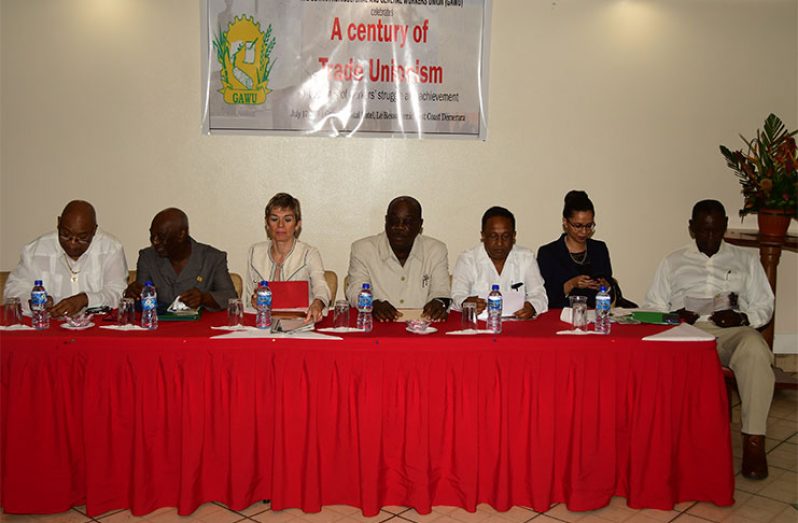ONE hundred years after the establishment of formal trade unionism in Guyana, the trade union movement is being urged to reorganise and reposition itself if it is to remain relevant in the 21st century.
This call was made by Minister within the Ministry of Social Protection, Keith Scott, during the celebration of the 100th anniversary of the local trade union movement at the Grand Coastal Hotel, on Wednesday.
“The leadership has to wake up to the reality that it is not what it used to be in the past, now a revolutionary approach is necessary for them to understand, especially ahead of the oil and gas sector,” said Scott.
He said the style of engagement has changed and it is not what it used to be. Scott believes that trade unions are under threat because less people belong to unions, there are fewer unions and there are less capable leaders with less vision.
“People need to have more confidence and develop confidence to take leadership of the union,” he asserted. In addition, he said it is time for unions to have a change in mindset by not looking into the past, but by moving forward and becoming the new dispensation which Guyana needs.
“Despite the odds, I have no doubt that trade unity will survive and unions will always stay together…once workers can see the fulfillment and unity that is necessary, they will rally behind the unions,” said the minister.

The beginning of the trade union movement can be traced to a strike by waterfront workers for increased wages in November and December 1905 in Georgetown, which was led by the indomitable Hubert Nathaniel Critchlow.
According to General Secretary of the Guyana Agricultural and General Workers Union (GAWU), Seepaul Narine, those waterfront workers faced opposition from the uncompromising shipping companies, and the conflict between the shipping companies and the workers had deteriorated into rioting and bloodshed and was only eventually settled after the British troops had been summoned.
It was Critchlow’s participation and role in this strike that gave him recognition as a workers leader. The failure of this 1905 strike clearly demonstrated to Critchlow that there was a pressing need for a trade union in the colony.
Critchlow reaffirmed his role as the undisputed leader of workers, and particularly among waterfront workers.
In fact, because of his initiative and proposals, Critchlow is credited as being the main force that was responsible for the gains achieved by workers in the January, 1917 and December, 1917 strikes. “Today, much of what Critchlow, his colleagues and his successors, together with the workers fought for in the years following 1919, have been realised. No longer are trade unions outlawed, but now-a-days the right to belong to unions has been enshrined in our Constitution and there is now the Trade Union Recognition Act as part of our Statues,” said Narine.
Today, too, following calls from the days of the infancy of the trade union movement, the Guyanese working-class are protected by a contributory social protection scheme. Similarly, child labour has been outlawed and workers are protected by the enactment of a national minimum wage.
Rights such as the payment of terminal benefits; to the setting of a retirement age; to the receipt of employer pensions, have become gains that go to enhance the workers well-being and lift their living standards.



.jpg)











